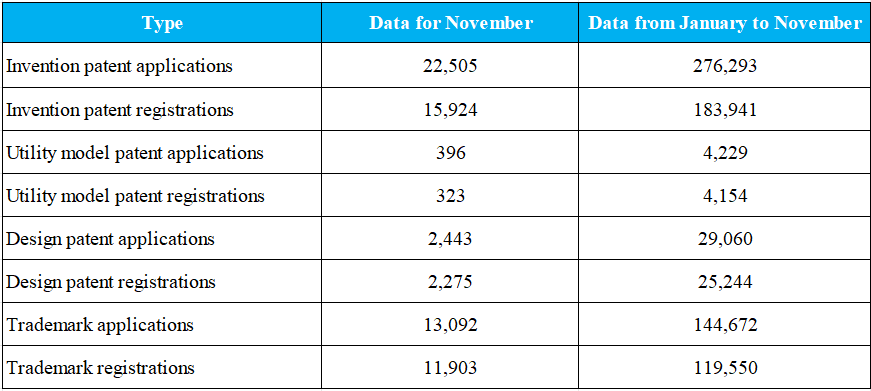International IP Express, January 2025
I. United States
USPTO Announces New Artificial Intelligence Strategy (January 14)
The United States Patent and Trademark Office (USPTO) has unveiled a new Artificial Intelligence (AI) strategy aimed at guiding the agency in addressing internal and external challenges posed by AI's impact on innovation and society. The strategy outlines a vision for how the USPTO can foster responsible and inclusive AI innovation, leverage AI to support its mission, and advance a positive future for AI to ensure that the US maintains its leadership in innovation.
The strategy seeks to achieve the USPTO's AI vision and mission through five key areas:(1)Promoting the development of intellectual property policies that foster inclusive AI innovation and creativity.
(2)Building world-class AI capabilities by investing in computational infrastructure, data resources, and business-driven product development.
(3)Promoting the responsible use of AI within the USPTO and across the broader innovation ecosystem.
(4)Developing AI expertise within the USPTO workforce.
(5)Collaborating with other US government agencies, international partners, and the public on shared AI priorities.
In addition, the USPTO plans to enhance its AI expertise by hiring examiners with AI experience and providing AI training to existing staff. The strategy also emphasizes the importance of maintaining public trust while increasingly utilizing AI tools.
Source: USPTO Announces New Artificial Intelligence StrategyUSPTO Releases Fee Study Report to Congress (January 16)
The USPTO has recently released a fee study report to Congress, as required by the Unleashing American Innovators Act of 2022 (UAIA). The study assessed several areas, including the potential impact on small and micro entities, whether fee structure changes are needed, and recommendations for administrative and legislative action.
Key findings of the report include:(1)Under the current fee structure, USPTO fees do not inhibit patent application filings by small and micro entities, which are more influenced by factors outside the USPTO.
(2)Complementary measures such as outreach or legal assistance programs could have a greater positive impact on participation rates of small and micro entities.
(3)The USPTO's fee structure, which defers about half of the examination costs to maintenance fees, does not impact or incentivize examination and patenting decisions.
(4)The current fee structure is potentially superior to other models considered due to its benefits for applicants and patentees.
(5)The USPTO proactively addressed one of the study's conclusions by setting additional fees for some continuing applications to recover examination costs.
(6)There is value in extending the USPTO's fee-setting authority beyond the September 2026 expiration included in the SUCCESS Act.
The study was conducted by academic economists Gaétan de Rassenfosse of the Ecole Polytechnique Fédérale de Lausanne, Switzerland, Adam B. Jaffe of Brandeis University, and Motu Economic and Public Policy Research in New Zealand.
II. Europe
Technology Intelligence Platform Unleashes Patent Data Potential (January 27)
On December 4, 2024, the European Patent Office (EPO) officially launched the Technology Intelligence Platform (TIP) at the Patent Knowledge Forum. TIP is an advanced browser-based data tool designed to help researchers, businesses, innovators, and general users unlock the potential of patent data through advanced analytics and visualization features. TIP now offers free access to high-quality EPO data, including full texts of European patents and the PATSTAT database, and supports users in integrating patent data with other data sources using powerful computational resources. During the launch event, live demonstrations showcased TIP's interface and functionalities, such as analyzing the evolution of patent technology fields over time. Additionally, TIP enhances user experience through Jupyter Labs and the full Python ecosystem, enabling users to retrieve and process patent data using third-party libraries.
Source: Technology Intelligence Platform | epo.orgEUIPO Joins Forces with Europol and EMA to Combat Fake Medicines (January 30)
The European Union Intellectual Property Office (EUIPO), Europol, and the European Medicines Agency (EMA) are collaborating on the #EUvsFakeMedicines campaign to raise awareness about the dangers of counterfeit medicines. These pose significant health risks to consumers and substantial costs to the EU's healthcare and social systems. The campaign focuses on two key aspects: the health risks associated with counterfeit medicines, which may be ineffective, cause severe side effects, or interact dangerously with other medications, and the organized crime groups behind these activities. To ensure safe online purchasing, the EU agencies recommend using only registered online pharmacies and verifying their legitimacy by checking the common logo and confirming their listing on national authority websites.
Source: EUIPO Joins Forces with Europol and EMA to Combat Fake Medicines
III. Japan
2024 Patent Application Data Statistics (January 30)
The Japan Patent Office (JPO) annually compiles and publishes the Patent Administration Annual Report (Data and Statistics Edition) to provide basic data on Japan's industrial property rights applications. This time, the JPO has decided to release the monthly rapid report data on which the report is based. The statistical rapid report values are based on the JPO's statistical processing data and provide a provisional tally of the number of applications, registrations, and trials for patents, utility models, designs, and trademarks, as well as the number of international applications for patents and trademarks and the number of patent application examination requests. Data is currently available up to November 2024.

Source: Patent Application Statistics Rapid Report
Workshop on Countermeasures Against Malicious Trademark Applications for Intellectual Property Office Staff from Albania, Bosnia and Herzegovina, and North Macedonia (January 31)
On January 22, under the framework of the Trademark Five Offices (TM5) and as part of the Japan Patent Office's (JPO) "Malicious Trademark Application Project," a workshop on countermeasures against malicious trademark applications was held for intellectual property office staff from Albania, Bosnia and Herzegovina, and North Macedonia. Approximately 50 trademark examiners attended.
The workshop also invited representatives from each TM5 office to exchange information on the project's overview and efforts to combat malicious trademark applications. By sharing specific experiences and cases, the workshop sparked lively discussions and highlighted the importance of addressing malicious trademark applications.
Source: Workshop on Malicious Trademark Applications for Intellectual Property Office Staff




